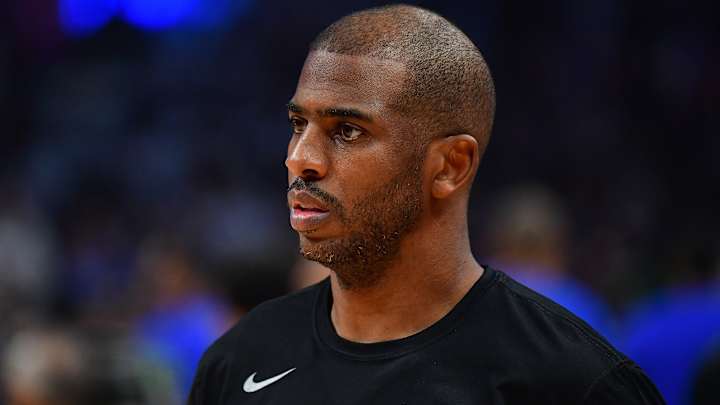Chris Paul Candidly Chronicles His Upbringing in New Book

Note: This interview was conducted before Paul’s trade from the Suns in June.
In late March, Chris Paul was eating breakfast at home when he decided to watch some old, family home videos. Chris’s father had recently had all the tapes accumulated over many years converted to DVD, allowing the memories to live on.
“One of the videos I came across looked like a party with my family,” Paul says. “And in walks my grandfather. And it was a video from his 60th birthday party. And it messed me up. I hadn’t heard my grandfather’s voice since I was 17.”
Growing up in Winston-Salem, N.C., Paul and his brother C.J. were incredibly close with their grandfather. So much so that after years of considering the right way to honor one of the more influential figures in his life, Paul decided to write a book. Sixty-One, about the life lessons he learned from Nathaniel “Papa” Jones. The title is both a reference to Jones’s age at his untimely passing and the number of points Paul scored in his honor in a high school game following his funeral.
The book is a candid look back at Paul’s upbringing, much of which he spent working for Jones at the gas station he owned. The stories told outline everything from the work ethic Paul observed and then internalized to fuel his now 18-year basketball career, to the racism he experienced growing up in the South, to his grandfather’s life of service that Paul himself has tried to embody.
Paul describes writing the book—an idea he and his brother came up with during the basketball-less days of quarantine in 2020—as one of the most emotional experiences of his life. He choked up multiple times while recording the audio version, verbalizing life moments he had not spoken about in decades. Jones died in November ’02, suffering a heart attack after being the victim of a robbery and assault—only one day after Paul had signed his letter of intent to attend Wake Forest.
A 12-time All-Star, Paul admits to being both nervous and excited about the reception of the very personal nature of Sixty-One. While doing a mini-media tour before the playoffs, he says hearing some of the words he’d written read back to him gave him goosebumps.
“This book was therapeutic for me,” Paul says. “There’s things in this book my parents probably didn’t know. My brother is always with me, sometimes I don’t express to him how much I love and appreciate him.”
It’s no act how close Paul is with his family. During his one year in Oklahoma City, for example, he would often fly back to Los Angeles between games or at the end of road trips to spend as much time as possible with his wife and kids. He says if there’s one thing he would be most proud to share with his grandfather today, it would be them, and how close his entire extended family has remained since Jones’s death.
Not exactly known as a huggable player on the court, Paul—who can be polarizing for his style of play—isn’t trying to win over any of his detractors with his personal reflections.
“This book is for any and everyone,” he says. “It’s about mentorship, it’s about love and support, it’s about family. Regardless of how you feel about me basketball-wise, even if you don’t know anything about basketball, there are lessons people can take from this.”

Rohan Nadkarni covers the NBA for SI.com. The Mumbai native and resident fashion critic has written for GQ.com, Miami Herald and Deadspin.